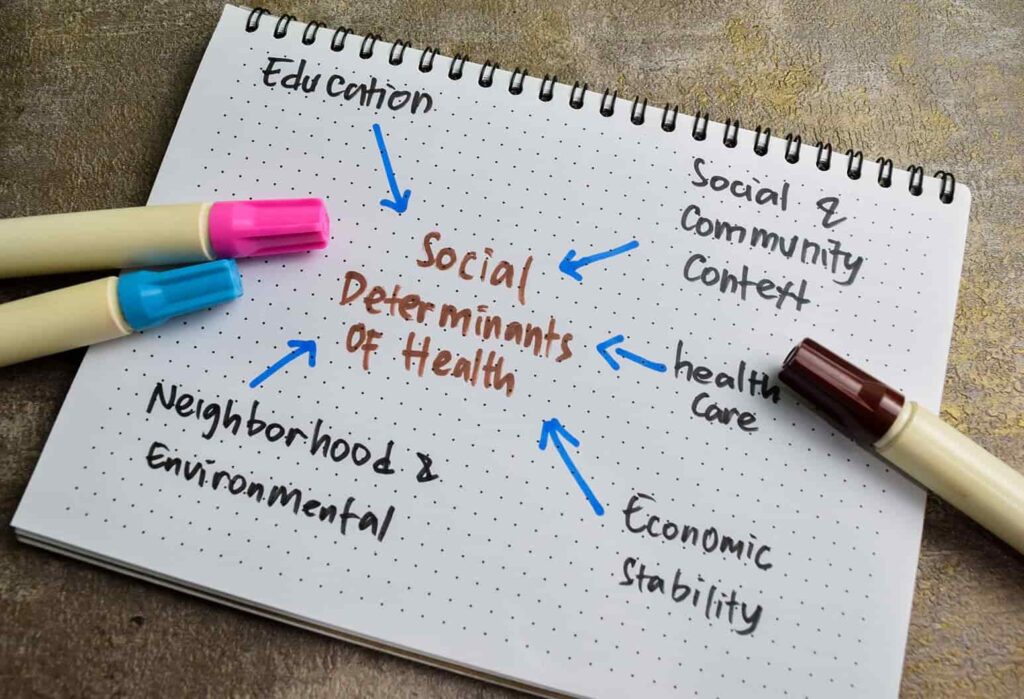The field of public health has long recognized that health outcomes are not solely determined by individual choices or genetics. A significant portion of our health is shaped by external factors, collectively referred to as social determinants of health (SDOH). These determinants encompass a broad range of influences, from socio-economic conditions and education to neighborhood environments and healthcare access.
In this article, we will explore how Mosaic Health, an organization committed to improving health equity, leverages these social determinants to enhance community health outcomes in the United States.
What are Social Determinants of Health?
Social determinants of health are the conditions in which people are born, grow, live, work, and age. These factors influence a wide range of health risks and outcomes and can be grouped into several key categories:
- Economic Stability: This includes income level, employment status, and poverty rates. Economic stability affects access to resources like nutritious food, safe housing, and quality healthcare.
- Education Access and Quality: Educational attainment is linked to health literacy and can significantly impact job opportunities and income, which in turn affect health outcomes.
- Health Care Access and Quality: Access to healthcare services, including preventive care and treatment, is crucial for maintaining good health. This includes health insurance coverage, availability of healthcare providers, and affordability of services.
- Neighborhood and Built Environment: The physical environment where individuals live, including housing quality, transportation options, and access to recreational facilities, can greatly influence health behaviors and outcomes.
- Social and Community Context: Social support networks and community engagement play vital roles in health outcomes. These factors can affect mental health and resilience during stressful times.
The Role of Mosaic Health in Addressing SDOH:

Mosaic Health is dedicated to addressing the complex interplay of social determinants to promote health equity. By focusing on the social determinants of health, the organization aims to identify and dismantle barriers that prevent individuals and communities from achieving optimal health. Here’s how Mosaic Health approaches this mission:
1. Community Engagement and Empowerment:
Mosaic Health prioritizes community involvement in health initiatives. Engaging local residents in the planning and implementation of health programs fosters ownership and ensures that interventions are culturally and contextually relevant. This empowerment enables communities to advocate for their own health needs and address local health disparities effectively.
2. Collaboration with Local Organizations:
Mosaic Health collaborates with various stakeholders, including schools, local governments, and non-profit organizations, to create a more integrated approach to health. By pooling resources and expertise, these collaborations enhance the effectiveness of health programs and broaden their reach.
3. Comprehensive Health Services:
Understanding that health is multifaceted, Mosaic Health offers a wide range of services that address various determinants. These services may include:
- Preventive Care: Providing access to regular check-ups, vaccinations, and screenings.
- Mental Health Services: Offering counseling and support for individuals facing mental health challenges.
- Nutrition and Wellness Programs: Educating community members on healthy eating habits and providing resources for accessing nutritious food.
- Housing Support: Assisting individuals in finding stable housing, as housing insecurity significantly impacts health.
4. Data-Driven Approach:
Mosaic Health utilizes data to identify health disparities within communities. By analyzing health outcomes in relation to social determinants, the organization can target interventions effectively. This evidence-based approach ensures that resources are allocated where they are most needed.
The Impact of Social Determinants on Health Outcomes:
The influence of social determinants on health is profound and wide-ranging. Research has consistently shown that individuals from disadvantaged backgrounds face greater health risks and experience worse health outcomes. Here are a few examples of how these determinants manifest in real-life scenarios:
1. Economic Disparities and Health:
People living in poverty often face food insecurity, lack of stable housing, and limited access to healthcare. These challenges can lead to chronic health conditions, such as diabetes and hypertension. For instance, individuals with low income may not afford regular medical care or healthy food options, leading to a cycle of poor health.
2. Education and Health Literacy:
Education is closely linked to health literacy, which refers to the ability to understand and use health information. Higher education levels often correlate with better health outcomes, as educated individuals are more likely to engage in preventive health behaviors and navigate healthcare systems effectively.
3. Access to Healthcare Services:
Communities with limited access to healthcare facilities or providers experience higher rates of untreated health conditions. For example, rural areas may lack specialists or transportation options, making it difficult for residents to receive timely medical attention.
4. Environmental Factors:
The neighborhoods in which individuals reside significantly impact their health. Communities with access to parks, recreational facilities, and clean air tend to promote healthier lifestyles. Conversely, areas with high pollution levels or unsafe living conditions can lead to adverse health effects, including respiratory diseases and mental health issues.
Addressing Health Disparities through Policy:

While organizations like Mosaic Health play a crucial role in addressing social determinants at the community level, policy changes are essential for creating sustainable improvements in public health. Here are several key policy areas that need attention:
1. Affordable Healthcare Access:
Policies that expand access to affordable healthcare, such as Medicaid expansion and subsidies for low-income individuals, can improve health outcomes significantly. Ensuring that everyone has health insurance coverage is a critical step towards achieving health equity.
2. Education Funding and Support:
Investing in education, particularly in underserved communities, can lead to long-term health benefits. Policies that provide resources for schools, scholarships for low-income students, and adult education programs can enhance health literacy and economic opportunities.
3. Housing Initiatives:
Developing affordable housing and supportive services for those experiencing homelessness or housing instability can mitigate health risks associated with poor living conditions. Policies that promote stable housing can lead to improved physical and mental health outcomes.
4. Food Security Programs:
Implementing programs that address food deserts, such as increasing access to fresh produce in low-income neighborhoods and providing nutrition education, can enhance community health. Policies that support local agriculture and community gardens can also promote food security.
The Future of Health Equity:
As we look to the future, the importance of addressing social determinants of health cannot be overstated. Organizations like Mosaic Health are at the forefront of this movement, working tirelessly to ensure that every individual has the opportunity to achieve optimal health, regardless of their socio-economic status. By fostering collaboration, community engagement, and evidence-based practices, we can create a more equitable health landscape in the United States.
FAQs:
1. What are social determinants of health?
These are factors like income, education, and environment that affect a person’s health.
2. How do social determinants impact health?
They influence access to resources like healthcare, housing, and food, shaping overall health outcomes.
3. How does Mosaic Health address social determinants?
Mosaic Health provides affordable healthcare, health education, and community support to address barriers like food insecurity and housing.
4. Why is economic stability important for health?
Economic stability helps individuals afford healthcare, healthy food, and safe housing, which are key to better health.
5. How does education affect health?
Higher education improves health knowledge, leading to healthier choices and better access to care.
6. How do social connections influence health?
Strong social networks improve mental and physical health, while isolation can negatively affect well-being.
7. What is Mosaic Health’s sliding fee scale?
Mosaic Health adjusts healthcare costs based on a patient’s financial situation.
8. How does the built environment affect health?
Neighborhoods lacking clean water, healthy food, and safe spaces for exercise contribute to poor health.
9. Why is health literacy important?
Health literacy helps people make informed decisions about managing their health and accessing care.
10. How can healthcare systems address social determinants?
By offering holistic care, working with communities, and advocating for better social and physical environments.
Conclusion:
Understanding social determinants of health is essential for anyone interested in improving health outcomes and achieving health equity. By addressing the root causes of health disparities, organizations like Mosaic Health are paving the way for healthier communities and a more just society. It is imperative for individuals, communities, and policymakers to work together to dismantle barriers and create an environment where everyone can thrive.